#Android App Developer Company
Text
Best Mobile App Development Company in India | Deligence Technologies
Deligence Technologies Inc. is a mobile app development company that offers a wide range of services to businesses looking to build a mobile app.
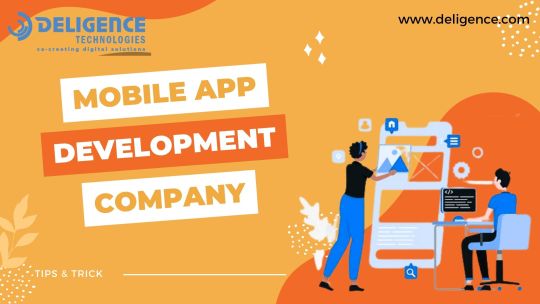
Our Strategies:
Their mobile app development process includes the following steps:
Discovery: Understanding the client's requirements, target audience, and business objectives.
Design: Creating a user-centric design that is visually appealing and intuitive to use.
Development: Developing the mobile app using the latest technologies and programming languages.
Testing: Conducting rigorous testing to ensure the app is free from bugs and glitches.
Deployment: Deploying the app on the app store and ensuring it meets the app store's guidelines and requirements.
Maintenance and support: Providing ongoing maintenance and support to ensure the app is up-to-date and functioning properly.
Our Services:
We offer a wide range of mobile app development services, including:
Native app development: Developing mobile apps that are specifically designed for a particular operating system, such as iOS or Android.
Hybrid app development: Developing mobile apps that can run on multiple platforms using a single codebase.
Web app development: Developing mobile apps that are accessed through a web browser.
Cross-platform app development: Developing mobile apps that can be deployed on multiple platforms, such as iOS, Android, and Windows.
UI/UX design: Creating engaging and intuitive user interfaces for mobile apps.
App maintenance and support: Providing ongoing maintenance and support for mobile apps to ensure they are up-to-date and functioning properly.
This company has a strong track record of delivering high-quality mobile app development services to clients in Noida and beyond.
Summary:
Deligence Technologies Inc. has experience in developing mobile apps for various industries, including healthcare, education, finance, and e-commerce. Their team of skilled developers, designers, and project managers works closely with clients to ensure their mobile app meets their business objectives and exceeds their expectations.
#mobile app development#mobile app#mobile application services#android app development#app development#android#android app developers#android app agencies#android app developer company#android application development#deligence#technology
3 notes
·
View notes
Text
2 notes
·
View notes
Text
Top Mobile Application Services India
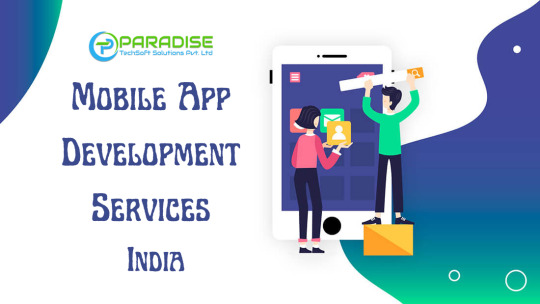
Paradise Techsoft Solutions intends to provide you the Best Mobile App Development Services India. Our professionals provide you with quality assurance and ensure that you would get better results than your expectations.
#Best Mobile App Development companies#ios app development services India#custom mobile app development Company#ios app development company#android app developer company
2 notes
·
View notes
Text
#spotneats#software development#android app developer company#mobileappdevelopment#business#startup#grocerydeliverysoftware#groceryorderingsoftware#grocery delivery app#grocery delivery app solution#grocery delivery app script#grocery delivery script#mobile app development#food delivery system#food delivery app#food delivery business
0 notes
Text
Mastering the Art of Android: Essential Tips for Successful App Development
Mastering the art of Android app development demands a thorough understanding of both technical aspects and focused on users' design ideas. Here are some important suggestions for successful app development.
1.Thorough Market Research: Before beginning development, undertake comprehensive market research to determine user wants, preferences, and pain points. Understanding your target demographic and competitors' offerings will help you plan your app's features and positioning.
2.Focus on User Experience (UX): Create your software with a user-centric mindset, stressing simple navigation, smooth interactions, and visually appealing interfaces. Conduct usability testing and collect feedback to improve the user experience throughout the development process.
3.Optimize Performance: To ensure that your app performs optimally, optimise the code, minimize resource utilization, and implement effective caching techniques. Performance concerns, such as poor load times or crashes, can cause user irritation and bad feedback.
4.Adaptability to Different Devices and Screen Sizes: Create an app that is responsive and suitable with a variety of Android devices and screen sizes. Use responsive layouts, scalable visuals, and adaptive UI components to ensure a consistent experience across devices.
5.Security and Privacy: Prioritise user data security by adopting strong encryption, authentication systems, and data storage best practices. To earn users' trust and secure their personal information, follow privacy regulations such as GDPR and CCPA.
6.Regular Updates and Maintenance: To keep your app running well, release updates on a regular basis to repair bugs, provide new features, and respond to customer comments. Continuously monitor app performance, analyse user analytics, and iterate depending on the findings.
7.Effective Monetization Strategy: Determine the best monetization plan for your app, whether it is in-app purchases, subscriptions, adverts, or a combination of these methods. Customise your monetization strategy to reflect your app's value proposition and target demographic.
8.Stay up to date on the newest trends : breakthroughs in Android app development, such as new SDKs, APIs, and design guidelines. Continuously engage in learning and skill development to stay ahead of the competition and provide people with novel experiences.
By following these fundamental tips and constantly refining your app development techniques, you can master the art of Android app development and produce profitable, compelling apps that connect with people.
1 note
·
View note
Text
What strategies are most effective for monetizing Android apps in today's competitive market?
In today's competitive industry, there are various highly effective techniques for selling Android apps. Here are a few key approaches:
freemium model : involves offering the software for free with basic functionality while charging for premium services or content. This strategy allows customers to try the software before making a purchase, potentially increasing conversion rates.
In-App Purchases: Including in-app purchases for extra features, virtual products, or premium content can result in big revenue. Offering appealing deals or unique items can entice users to make purchases through the app.
Subscription Model: Using subscription pricing to provide recurrent access to premium services or content. This approach generates a consistent stream of money while encouraging customer retention through ongoing access to attractive services.
Advertising: Integrating adverts into the app might be a profitable revenue technique. Using customised advertising based on user demographics and behaviour can increase ad income while reducing user intrusion.
Sponsorship and Partnerships: Working with companies or organizations to sponsor or incorporate their products/services within the app might result in money from sponsorship deals or affiliate marketing programs.
Incentivized Actions: By offering incentives to users for performing specific actions within the app, such as watching ads, completing surveys, or recommending friends, you may increase user engagement and revenue.
Data Monetization: Using user data (with proper consent and attention to privacy standards) to give personalised experiences, targeted advertising, or valuable insights to third-party partners can be a profitable source of money.
Crowdfunding: Engaging with the app's community through crowdfunding platforms to raise funds for app development or feature additions, while providing backers with unique incentives or early access.
Offering White Label Solutions: Creating customisable versions of the program for businesses or organisations to rebrand and utilise for their specific requirements, with revenue generated through licensing fees or modification services.
Continuous Updates and service: Providing regular updates, new features, and quick customer service can improve user happiness and loyalty, resulting in improved monetization prospects through repeat usage and favourable word of mouth referrals.
In today's competitive marketplace, Android app development can efficiently profit from their Android apps by combining these tactics and reacting to changing market trends and user preferences.
1 note
·
View note
Text
Unlocking the Potential: Arduino Programming for Beginners

Arduino programming opens up a world of endless possibilities for beginners looking to dive into the exciting realm of electronics and robotics. Whether you're an aspiring engineer, hobbyist, or student, learning Arduino programming can be both rewarding and empowering. In this beginner's guide, we'll explore the fundamentals of Arduino programming, its applications, and how you can get started on your journey towards building your own innovative projects.
What is Arduino?
Arduino is an open-source electronics platform that provides a user-friendly interface for building interactive electronic projects. At its core, Arduino consists of a microcontroller board and a development environment for writing and uploading code to the board. With Arduino, you can create anything from simple LED blinkers to complex robotic systems, making it an ideal platform for beginners and experienced makers alike.
Understanding Arduino Programming:
At the heart of Arduino programming is the Arduino IDE (Integrated Development Environment), a software tool used to write, compile, and upload code to the Arduino board. The language used for Arduino programming is based on C/C++, but it's simplified and tailored for ease of use, making it accessible even to those with limited programming experience.
Getting Started:
Setting up the Arduino IDE: The first step in arduino programming for beginners is to download and install the Arduino IDE from the official website (https://www.arduino.cc/en/Main/Software). Once installed, you'll need to select the appropriate board and port from the Tools menu to establish a connection between your computer and the Arduino board.
Writing Your First Sketch: In Arduino programming, a sketch refers to the code that runs on the Arduino board. A simple "Hello World" example for Arduino involves blinking an LED connected to one of the digital pins on the board. With just a few lines of code, you can control the behavior of the LED, turning it on and off at specified intervals.
Understanding Basic Syntax: Arduino programming syntax is similar to C/C++, consisting of statements, functions, variables, and control structures. Familiarizing yourself with basic programming concepts such as loops, conditionals, and functions will help you write more complex Arduino sketches as you progress.
Exploring Applications:
The versatility of Arduino makes it suitable for a wide range of applications, from home automation and robotics to interactive art and wearable technology. Here are just a few examples of what you can create with Arduino programming:
Home Automation: Use Arduino to automate lights, thermostats, and other appliances in your home, making them smarter and more energy-efficient.
Robotics: Build robotic projects ranging from simple line-following robots to advanced autonomous drones, leveraging Arduino's motor control and sensor integration capabilities.
IoT (Internet of Things): Connect Arduino to the internet and gather data from sensors to monitor environmental conditions, control devices remotely, and create interactive IoT projects.
Interactive Art: Create interactive art installations with Arduino, incorporating sensors, lights, and sound to engage viewers in immersive experiences.
Wearable Technology: Design wearable devices such as fitness trackers, smart watches, and health monitors using Arduino and compatible sensors.
Resources for Beginners:
As you embark on your Arduino programming journey, there are numerous resources available to support your learning:
Online Tutorials: Websites like https://technobotics.in/ offer a wealth of tutorials, guides, and project ideas for beginners and advanced users alike. From basic LED blinking tutorials to advanced robotics projects, you'll find everything you need to kickstart your Arduino journey.
Community Forums: Join online forums and communities such as the Arduino Forum (https://forum.arduino.cc/) to connect with fellow makers, ask questions, and share your projects and experiences.
Books and Guides: Explore beginner-friendly books and guides on Arduino programming available online and in bookstores, providing comprehensive coverage of Arduino fundamentals and project ideas.
Conclusion:
Arduino programming offers a gateway to creativity, innovation, and exploration for beginners eager to delve into the world of electronics and robotics. With its intuitive interface, vast community support, and endless possibilities for experimentation, Arduino empowers individuals of all ages and backgrounds to turn their ideas into reality. Whether you're a student, hobbyist, or aspiring engineer, learning arduino programming for beginners is a journey worth embarking on as you unlock the potential to create, innovate, and inspire. Start your Arduino journey today and see where your imagination takes you!
#robotics courses#android app developer company#stem education#arduino programming courses#robotics courses for kids#robotics#technology#android app agencies#breadboard electronics for beginners#robotics for kids
0 notes
Text
The Future of Android App Development: Trends to Watch in 2024 and Beyond
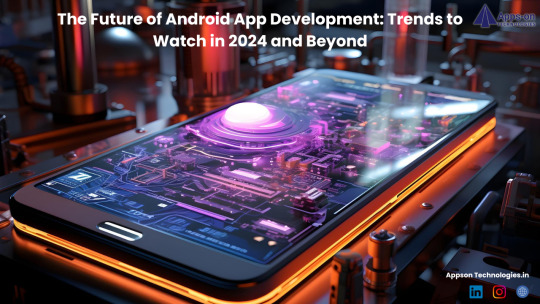
The Android operating system has become synonymous with mobile innovation, powering billions of devices worldwide. As technology continues its relentless march forward, Android app development is poised for an exciting metamorphosis. This article delves into the key trends shaping the future of Android app development, exploring groundbreaking technologies and innovative approaches that will transform how we interact with mobile apps.
The Rise of Artificial Intelligence (AI) and Machine Learning (ML):
AI and ML are no longer relegated to science fiction; they are rapidly becoming the driving force behind intelligent and personalized user experiences. Here's how these technologies will reshape Android app development:
Hyper-Personalization: Gone are the days of generic app experiences. AI-powered apps will leverage user data, preferences, and usage patterns to curate a truly personalized journey. Imagine a news app that proactively recommends articles based on your interests, a fitness tracker that tailors workout plans to your fitness level, or a music streaming service that anticipates your mood and suggests the perfect playlist.
Enhanced Functionality: AI can seamlessly integrate into various aspects of app functionality. Voice recognition will allow for natural and intuitive interactions, while AI-powered chatbots can provide real-time customer support or answer user queries in an informative and engaging way. Machine learning algorithms can optimize app performance by analyzing usage data and identifying areas for improvement.
Predictive Analytics: By analyzing user behavior, app preferences, and historical data, AI can predict user needs and proactively assist them. Imagine a shopping app that suggests items you might be interested in based on your past purchases or a travel app that anticipates your travel needs and recommends hotels, restaurants, and attractions based on your preferences.
Augmented Reality (AR) and Virtual Reality (VR): Redefining User Experiences
AR and VR are blurring the lines between the physical and digital worlds, offering immersive experiences that were once confined to the realm of entertainment. Here's how these technologies will transform Android apps:
Revolutionizing Gaming: The future of mobile gaming lies in AR and VR. AR games will overlay virtual elements onto your real-world surroundings, creating captivating experiences where fantasy and reality collide. Imagine battling aliens in your living room or embarking on a virtual treasure hunt in your neighborhood park. VR, on the other hand, can transport you entirely to new worlds, offering unparalleled gaming experiences that defy the limitations of traditional displays.
Enhanced Learning and Training: AR and VR have the potential to revolutionize education and training. Imagine exploring the human body in 3D detail during biology class or experiencing historical events firsthand through a VR simulation. These technologies can make learning more engaging, interactive, and accessible for people of all ages.
Transforming Retail and E-commerce: The way we shop is undergoing a significant shift. Customers can use AR apps to virtually try on clothes or visualize how furniture would look in their homes before making a purchase. VR showrooms can allow customers to explore entire product lines from the comfort of their homes, potentially leading to increased sales and reduced return rates.
The Power of 5G and Edge Computing: A New Era of Connectivity
The arrival of 5G, the next generation of mobile network connectivity, marks a significant leap forward. With its blazing-fast speeds and ultra-low latency, 5G will pave the way for a new era of app experiences:
Real-time Applications: Imagine seamless video streaming without buffering, lag-free online gaming with instantaneous responses, and real-time data synchronization across all your devices. 5G's high bandwidth will make these experiences a reality, transforming how we interact with apps on the go.
Cloud-Based Processing: Complex processing tasks can be handled by powerful cloud servers thanks to 5G's capabilities. This frees up resources on your device for a smoother user experience. Imagine editing high-resolution videos on your phone or performing complex scientific simulations directly on your mobile device, all powered by the cloud.
The Internet of Things (IoT) Integration: 5G's ability to connect a vast network of smart devices seamlessly will be a game-changer for the Internet of Things (IoT). Android apps can act as central hubs for controlling these devices, creating smarter and more interconnected homes and environments. Imagine using your phone to adjust lighting, monitor energy consumption, or control smart appliances in your home remotely.
Prioritizing User Privacy and Security: A Growing Focus
In today's digital age, user privacy and security are paramount concerns. Google, the developer of the Android operating system, has always emphasized these aspects, and this focus will continue to shape the future of Android app development:
Enhanced Data Protection Features: Expect to see even more robust data encryption methods and user controls over data collection practices within Android apps. Developers will need to be transparent about how user data is collected, stored, and used. This may involve features like allowing users to easily access and manage their data within the app, or offering granular control over permissions granted to the app.
Focus on Biometric Authentication: Fingerprint scanning, facial recognition, and other biometric authentication methods will become increasingly commonplace. These methods provide a more convenient and secure alternative to traditional passwords, allowing users to access apps and protect sensitive information with a simple touch or glance.
Increased Scrutiny of Third-Party Data Sharing: Google is likely to tighten regulations around how apps share user data with third parties. Developers will need to ensure that user data remains secure and is only used for the purposes explicitly consented to by the user. This may involve implementing stricter data sharing agreements with third-party services or providing users with clear and concise information about how their data might be shared.
The Rise of Progressive Web Apps (PWAs): A Hybrid Approach
Progressive Web Apps (PWAs) offer a unique blend of web and mobile app functionalities. They provide a native-like experience, accessible through a web browser, without the need to download an app from the Google Play Store. Here's how PWAs are gaining traction in the Android app development landscape:
Improved Accessibility: PWAs offer a wider reach for developers, as users don't need to download them from the Play Store. This can be particularly beneficial for geographically restricted regions or users with limited storage space on their devices. Users can simply access the PWA through a web browser, ensuring they have the latest version without manual updates.
Offline Functionality: PWAs can be designed to work offline, allowing users to access certain features and content even without an internet connection. This can be a major advantage for situations with spotty internet coverage or limited data plans. Imagine using a PWA for note-taking or managing to-do lists even without internet access, with the data syncing to the cloud once you're back online.
Reduced Development Costs: Developing a PWA can be more cost-effective compared to creating a fully native Android app. This allows developers to experiment with new ideas and reach a broader audience without a hefty investment. Additionally, PWAs can leverage existing web development skills, potentially streamlining the development process.
The Continued Evolution of Kotlin: A Powerful Programming Language
Kotlin, a modern and expressive programming language, has become the preferred choice for Android app development. Here's how Kotlin will continue to shape the future:
Improved Readability and Maintainability: Kotlin's concise syntax and focus on safety features like null safety checks lead to cleaner and more maintainable code. This translates to fewer bugs, easier collaboration among developers, and a smoother development process.
Enhanced Interoperability with Java: Kotlin seamlessly integrates with existing Java codebases, allowing developers to leverage existing libraries and frameworks while writing new code in Kotlin. This smooth integration ensures a more efficient transition to Kotlin for developers with a Java background.
Focus on Developer Productivity: Kotlin offers features such as coroutines for asynchronous programming, which simplify writing code for complex tasks and improve overall developer productivity. This allows developers to focus more on creating innovative app features and user experiences.
The Foldable Phone Revolution: A New Form Factor for Android Apps
Foldable phones are no longer a futuristic concept; they are becoming increasingly popular. These devices present a unique challenge and opportunity for app developers:
Adapting to a Changing Screen Size: Apps need to be designed to adapt to the changing screen size of foldable phones seamlessly. This may involve creating layouts that can function effectively in both unfolded and folded states, ensuring an optimal user experience regardless of how the device is being used.
Unlocking New Possibilities: The larger screen size of unfolded foldable phones opens doors for innovative app experiences. Imagine using a foldable phone to edit photos with more screen real estate or multitask by having multiple apps open simultaneously on the unfolded display.
Collaboration between Developers and Device Manufacturers: Optimizing apps for foldable phones requires close collaboration between developers and device manufacturers. This collaboration will ensure that apps can leverage the unique capabilities of foldable devices and provide users with a seamless experience.
Blockchain Technology: Exploring the Potential
While still in its early stages of exploration within Android app development, blockchain technology holds immense potential for the future:
Enhanced Security and Transparency: Blockchain technology can be used to create secure and transparent data storage solutions. This could be beneficial for apps that handle sensitive user data, such as financial transactions or healthcare information.
Decentralized Applications (dApps): Blockchain technology can pave the way for the development of decentralized applications (dApps) on the Android platform. These dApps would be independent of any central authority, potentially offering greater control and privacy to users.
New Revenue Models: Blockchain technology could revolutionize in-app purchases and monetization strategies. Imagine using cryptocurrency for in-app purchases or microtransactions within Android apps. Additionally, blockchain could facilitate new models like tokenized rewards or loyalty programs within apps.
The Growing Importance of Accessibility:
Making apps accessible to everyone, regardless of their abilities, is becoming an essential aspect of responsible app development. Here's how accessibility will shape the future:
Focus on Inclusive Design: Developers will need to prioritize features like screen reader compatibility, improved color contrast, and support for alternative input methods (like voice commands or gesture controls). This ensures that users with visual impairments, motor disabilities, or other challenges can interact with apps seamlessly.
Compliance with Accessibility Guidelines: Google is likely to place greater emphasis on accessibility standards when reviewing apps for the Play Store. Developers will need to ensure their apps comply with these guidelines to be published and reach a wider audience.
A Moral and Business Imperative: Accessibility is not just a technical consideration; it's a moral responsibility. By making apps accessible, developers can tap into a broader user base and create a more inclusive mobile experience for everyone.
The Rise of Low-Code and No-Code Development Platforms:
Low-code and no-code development platforms are simplifying app creation, making it accessible to a wider range of users. Here's how these platforms might impact the future:
Democratizing App Development: These platforms allow individuals with limited coding experience to create basic apps. This opens doors for citizen developers who have great ideas but lack the technical expertise to bring them to life.
Focus on Business Logic and User Experience: Low-code and no-code platforms handle the technical complexities of app development, allowing users to focus on the core functionality and user experience of their app.
A Potential Disruption for Traditional Developers? While these platforms could streamline app creation for some, they are unlikely to replace traditional developers entirely. Complex apps with advanced features will still require the expertise of experienced developers.
The Future is Bright: A World of Possibilities Awaits
The future of Android app development is brimming with exciting possibilities. From the power of AI and the immersive experiences of AR/VR to the transformative potential of 5G and the ever-evolving landscape of user privacy and security, developers have a treasure trove of tools at their disposal to create apps that are not only feature-rich but also intelligent, intuitive, and deeply personalized. As these trends continue to evolve, we can expect Android apps to become an even more integral part of our daily lives, seamlessly integrated into the fabric of our work, leisure, and overall mobile experience.
Connect Now
Flutter Experts
#technology#tech#android#android app development#android app developer#android app developer company#future#trends#future trends
0 notes
Text
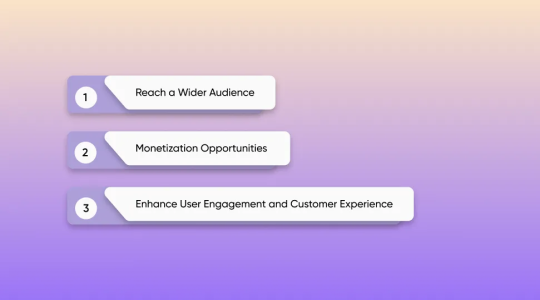
Android app development offers numerous benefits for businesses, including increased brand visibility, expanded customer reach, enhanced customer engagement, and improved sales opportunities.
With a custom Android app, businesses can provide convenient access to products and services, streamline operations, and stay ahead in today's competitive market landscape.
Read Blog here
#android app development#android application development company in chennai#android app developers#android app developer company#android app design#business#strategies#app development#services
0 notes
Text

Take advantage of our IOS App Development solutions to start your digital transformation journey, tailored to your specific business goals and demands. Whether you're developing a brand-new app or improving an old one, our team puts forth endless effort to provide solutions that boost productivity, encourage user engagement, and stimulate business expansion.
#marketing#developers & startups#mobile app development#android app developer company#android app development#mobile app developer company
0 notes
Text
The entire spectrum of hybrid app development provides compelling solutions for businesses working on the maximization of their digital presence. Its advantages include cost-effectiveness and a shorter time to market. The embracement of app development not only revolves around building apps but also transforms the digital experience for both customers and businesses alike.
0 notes
Text
We are a leading Android app development company with a unique portfolio. Our team of experts uses the latest tools and technologies to build the industry.
#android app#app development#android#android app development#android application development company in indiai#android app developer company#android app developers#android app design#development#app developers#app development company#mobile app development#it services#birdmorning
1 note
·
View note
Text
youtube
Watch the American Climate Leadership Awards 2024 now: https://youtu.be/bWiW4Rp8vF0?feature=shared
The American Climate Leadership Awards 2024 broadcast recording is now available on ecoAmerica's YouTube channel for viewers to be inspired by active climate leaders. Watch to find out which finalist received the $50,000 grand prize! Hosted by Vanessa Hauc and featuring Bill McKibben and Katharine Hayhoe!
#ACLA24#ACLA24Leaders#youtube#youtube video#climate leaders#climate solutions#climate action#climate and environment#climate#climate change#climate and health#climate blog#climate justice#climate news#weather and climate#environmental news#environment#environmental awareness#environment and health#environmental#environmental issues#environmental justice#environment protection#environmental health#Youtube
17K notes
·
View notes
Text
Mastering the Craft: Navigating the Challenges and Opportunities in Android Application Development
"Mastering the Craft: #Systimanx adeptly navigates the challenges and opportunities of #Androidapplicationdevelopment with cutting-edge technologies and strategic insights. With a focus on innovation and expertise, they pave the way for success in the dynamic world of #mobileappdevelopment."
#android app development#android application development#mobile app development#technology#app development company#web app development#mobile app development company in india#android developer#android app design#android app developer company#systimanx#app developing company#android app developers
1 note
·
View note
Text
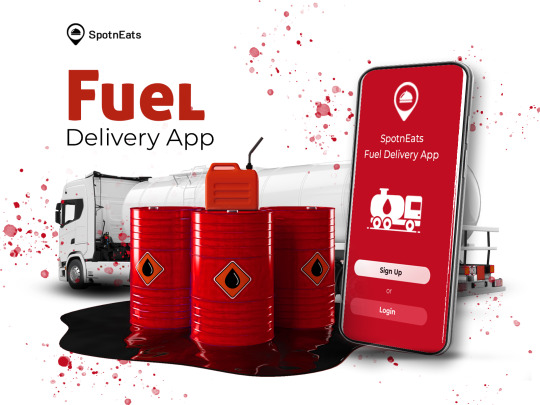
Fuel up your life with SpotnEats Fuel Delivery App! Say goodbye to the hassle of fuel refilling and hello to convenience at your fingertips.
For your app development services: https://rb.gy/8h32f
#spotneats#software development#android app developer company#mobileappdevelopment#business#startup#fueldeliveruapppdevelopment#fueldeliveryapp#gasdeliveryapp#uberfueldeliveryapp#gasonlinedeliveryapp
0 notes
Text
#technology#techinnovation#technomusic#tec#android#android app#android app development#android app developer company#android app developers#android application development
1 note
·
View note
Text
More #Android apps riddled with #malware spotted on #GooglePlay
#cybersecurity#android app development#android application development#android app developer company#android app developers#android app design#android#android apps#malware#virus#spyware#ausgov#politas#auspol#tasgov#taspol#australia#fuck neoliberals#neoliberal capitalism#anthony albanese#albanese government#psalms#this has been a psa#important psa#psa#infotech#information technology#technology#tech#technews
0 notes
Text
youtube
Watch the 2024 American Climate Leadership Awards for High School Students now: https://youtu.be/5C-bb9PoRLc
The recording is now available on ecoAmerica's YouTube channel for viewers to be inspired by student climate leaders! Join Aishah-Nyeta Brown & Jerome Foster II and be inspired by student climate leaders as we recognize the High School Student finalists. Watch now to find out which student received the $25,000 grand prize and top recognition!
#ACLA24#ACLA24HighSchoolStudents#youtube#youtube video#climate leaders#climate solutions#climate action#climate and environment#climate#climate change#climate and health#climate blog#climate justice#climate news#weather and climate#environmental news#environment#environmental awareness#environment and health#environmental#environmental issues#environmental education#environmental justice#environmental protection#environmental health#high school students#high school#youth#youth of america#school
17K notes
·
View notes